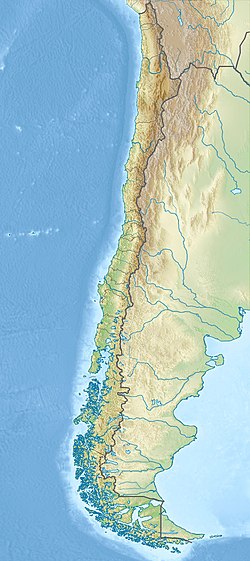The Quiriquina Formation is a geological formation in Chile whose strata date back to the Late Cretaceous. Dinosaur remains are among the fossils that have been recovered from the formation.[1] The glauconitic sandstones and conglomerates of the formation were deposited in a marine environment.[2]
| Quiriquina Formation | |
|---|---|
| Stratigraphic range: Late Maastrichtian | |
| Type | Geological formation |
| Unit of | Arauco Group |
| Underlies | Lebu Group |
| Overlies | Granitic rocks |
| Lithology | |
| Primary | Sandstone |
| Other | Conglomerate |
| Location | |
| Coordinates | 33°30′S 71°42′W / 33.5°S 71.7°W |
| Approximate paleocoordinates | 35°36′S 59°12′W / 35.6°S 59.2°W |
| Region | Bío Bío, Concepción & Valparaíso Regions |
| Country | |
| Extent | Arauco Basin |
| Type section | |
| Named for | Quiriquina Island |
| Named by | Biró-Bagóczky |
| Year defined | 1982 |
Vertebrate paleofauna
editSee also
editReferences
edit- ^ a b Weishampel, David B; et al. (2004). "Dinosaur distribution (Late Cretaceous, South America)." In: Weishampel, David B.; Dodson, Peter; and Osmólska, Halszka (eds.): The Dinosauria, 2nd, Berkeley: University of California Press. Pp. 600-604. ISBN 0-520-24209-2.
- ^ Cocholgüe village, sea coast at Fossilworks.org
- ^ Quiriquina at Fossilworks.org
Further reading
edit- H.-V. Karl and G. Tichy. 2002. Australobaena chilensis n. gen. n. sp., and the homology of secondary palatines in marine turtles (Anapsida: Testudines). Studia Geologica Salmanticensia 38:11-19
- Mario E. Suárez, Henri Cappetta. 2004. Sclerorhynchid teeth from the Late Cretaceous of the Quiriquina Formation
- M. E. Suarez and O. Fritis. 2002. Nuevo registro de Aristonectes sp. (Plesiosauroidea incertae sedis) del Cretácico Tardío de la Formación Quiriquina, Cocholgüe, Chile. Boletín de la Sociedad de Biología de Concepción 73:87-93
